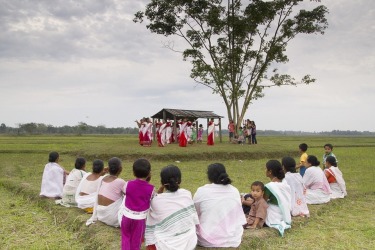
Several thousand tea estate workers, many of them Catholics, took to the streets of Dibrugarh, Assam, on 13 October to demand constitutional recognition as tribal people, higher wages, and legal land ownership.
The large-scale protest was organised jointly by the Assam Chah Mazdoor Sangha (ACMS), the state’s main tea labourers’ union, and the Assam Tea Tribes Students’ Association (ATTSA). Demonstrators accused the ruling Bharatiya Janata Party (BJP) of failing to deliver on promises made during previous elections.
Activist John Minj said the primary demand was to include Assam’s tea workers in India’s federal list of Scheduled Tribes (STs). This status would make them eligible for government job and education quotas, as well as access to welfare programmes under the country’s affirmative action system.
“There are about six million people working in Assam’s tea gardens, forming roughly 17 per cent of the state’s population,” local Catholic leaders said. Most are descendants of tribal labourers brought from other regions of India during the British colonial period.
Assam is the world’s largest tea-growing region, with more than 800 large estates and thousands of smaller plantations producing around 800 million kilograms of tea annually.
Workers currently earn 250 rupees (around US$2.83) a day, a rate activists describe as inadequate. Protesters are calling for the minimum daily wage to be raised to 550 rupees.
Many families living on tea estates also lack legal rights to the land they occupy. “We are demanding the immediate granting of land deeds to tea tribe families,” Minj said.
Archbishop John Moolachira of Guwahati, president of the Northeast India Regional Bishops’ Council, voiced support for the demonstrators. “The tea tribes deserve equal rights as citizens of this country,” he told UCA News. “Their living conditions are worrisome - poor housing, lack of education, and inadequate healthcare. The Catholic Church stands in solidarity with them.”
Allen Brooks, spokesperson for the Assam Christian Forum, criticised the state government’s ongoing neglect. “If the tea tribes are recognised as Scheduled Tribes, their socio-economic condition will certainly improve,” he said.
Nabin Chandra Keot, secretary of the ACMS’s Dibrugarh unit, said the workers’ three main demands, tribal recognition, fair wages, and land rights, were “non-negotiable”. He confirmed that similar demonstrations would take place across Assam in the coming months to intensify pressure on the government ahead of the 2026 state elections.
Assam has approximately 1.1 million Christians, representing less than four per cent of the state’s population, still higher than India’s national average of 2.3 per cent. Many tea estate workers belong to this Christian minority, which plays an active role in supporting community welfare and social justice initiatives.
Adapted from UCA News.




